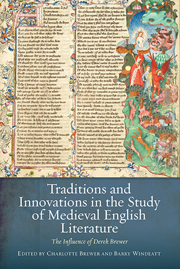 Traditions and Innovations in the Study of Medieval English Literature
Traditions and Innovations in the Study of Medieval English Literature Book contents
- Frontmatter
- Contents
- List of Contributors
- Acknowledgements
- Note on References
- Introduction: A Modern Medievalist's Career
- 1 Derek Brewer: Chaucerian Studies 1953–78
- 2 Brewer's Chaucer and the Knightly Virtues
- 3 Class Distinction and the French of England
- 4 Time in Troilus and Criseyde
- 5 Virtue, Intention and the Mind's Eye in Troilus and Criseyde
- 6 Falling in Love in the Middle Ages
- 7 The Idea of Feminine Beauty in Troilus and Criseyde, or Criseyde's Eyebrow
- 8 ‘Greater Love Hath No Man’: Friendship in Medieval English Romance
- 9 Gowerian Laughter
- 10 Derek Brewer's Romance
- 11 Malory and Late Medieval Arthurian Cycles
- 12 The Ends of Storytelling
- 13 Manuscripts, Facsimiles, Approaches to Editing
- 14 Words and Dictionaries: OED, MED and Chaucer
- 15 Afterlives: The Fabulous History of Venus
- Afterword: Derek Brewer: with ful deuout corage
- Bibliography
- Index
- Tabula in Memoriam
2 - Brewer's Chaucer and the Knightly Virtues
Published online by Cambridge University Press: 05 September 2013
- Frontmatter
- Contents
- List of Contributors
- Acknowledgements
- Note on References
- Introduction: A Modern Medievalist's Career
- 1 Derek Brewer: Chaucerian Studies 1953–78
- 2 Brewer's Chaucer and the Knightly Virtues
- 3 Class Distinction and the French of England
- 4 Time in Troilus and Criseyde
- 5 Virtue, Intention and the Mind's Eye in Troilus and Criseyde
- 6 Falling in Love in the Middle Ages
- 7 The Idea of Feminine Beauty in Troilus and Criseyde, or Criseyde's Eyebrow
- 8 ‘Greater Love Hath No Man’: Friendship in Medieval English Romance
- 9 Gowerian Laughter
- 10 Derek Brewer's Romance
- 11 Malory and Late Medieval Arthurian Cycles
- 12 The Ends of Storytelling
- 13 Manuscripts, Facsimiles, Approaches to Editing
- 14 Words and Dictionaries: OED, MED and Chaucer
- 15 Afterlives: The Fabulous History of Venus
- Afterword: Derek Brewer: with ful deuout corage
- Bibliography
- Index
- Tabula in Memoriam
Summary
The consonance between the character of Derek Brewer and the character of much medieval literature was elegantly noted in the fine obituary which Barry Windeatt wrote for The Independent newspaper:
People often commented that it was the moral concerns of English medieval literature – courtesy, honour, loyalty and integrity – that they observed to be lived out in Brewer's life.
(Windeatt 2008)Here Windeatt evokes the gentlemanly virtues – the remnants of a knightly value-system wherein great store was set by honour and gentilesse (nobility of birth or rank together with the attendant moral qualities of nobility of character or manners; generosity, kindness, gentleness, graciousness and the like). Indeed, it was no surprise to read, in the Telegraph obituary, Derek Brewer being described as ‘a gentlemanly, kindly man’. The thought that I want to offer in this paper is that those same virtues enabled Derek to gain some of his greatest insights into Chaucer's mind and art (to use a phrase in vogue in the late 1960s and early 1970s, when he was producing much of his best work). I am going to celebrate some of those insights – expanding them here, qualifying them there – because I believe they have withstood very well the buffets of changing academic fashions.
- Type
- Chapter
- Information
- Traditions and Innovations in the Study of Medieval English LiteratureThe Influence of Derek Brewer, pp. 34 - 47Publisher: Boydell & BrewerPrint publication year: 2013
